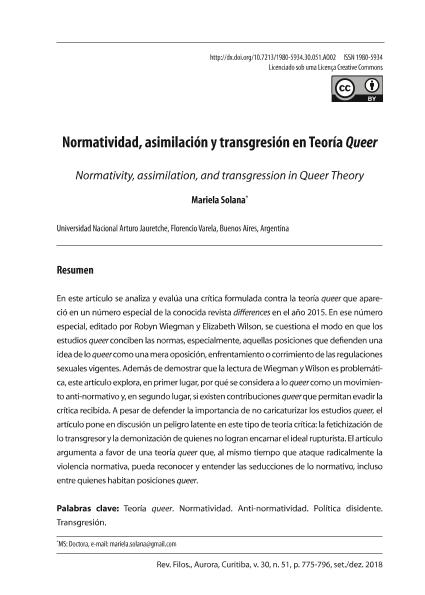Artículo
En este artículo se analiza y evalúa una crítica formulada contra la teoría queer que apareció en un número especial de la conocida revista differences en el año 2015. En ese número especial, editado por Robyn Wiegman y Elizabeth Wilson, se cuestiona el modo en que los estudios queer conciben las normas, especialmente, aquellas posiciones que defienden una idea de lo queer como una mera oposición, enfrentamiento o corrimiento de las regulaciones sexuales vigentes. Además de demostrar que la lectura de Wiegman y Wilson es problemática, este artículo explora, en primer lugar, por qué se considera a lo queer como un movimiento anti-normativo y, en segundo lugar, si existen contribuciones queer que permitan evadir la crítica recibida. A pesar de defender la importancia de no caricaturizar los estudios queer, el artículo pone en discusión un peligro latente en este tipo de teoría crítica: la fetichización de lo transgresor y la demonización de quienes no logran encarnar el ideal rupturista. El artículo argumenta a favor de una teoría queer que, al mismo tiempo que ataque radicalmente la violencia normativa, pueda reconocer y entender las seducciones de lo normativo, incluso entre quienes habitan posiciones queer. This paper explores and assess the critique of Queer Theory that appeared in a special number of the well-known Journal differences, in 2015. This special number, edited by Robyn Wiegman y Elizabeth Wilson, puts into question the ways in which Queer Theory has conceived of norms, especially, among those queer thinkers that defend an idea of queerness as a mere opposition, confrontation or evasion of current sexual regulations. Besides trying to prove that Wiegman and Wilson are wrong in their interpretation of Queer Theory, this article explores, firstly, why is queerness so often linked to antinormativity and, secondly, if there are queer contributions that can help us evade this sort of criticism. In spite of defending the importance of not making a caricature out of Queer Theory, this article discusses one of the dangers of this kind of critical approach: the re-idealization of all-things transgressive and the demonization of those lives that cannot achieve the subversive ideal. This article argues for a Queer Theory that, simultaneously, attacks normative violence and recognizes and understands the seductions of the normative, even among those who inhabit queer positions.
Normatividad, asimilación y transgresión en Teoría Queer
Título:
Normativity, assimilation, and transgression in Queer Theory
Fecha de publicación:
11/2018
Editorial:
Pontifícia Universidade Católica do Paraná
Revista:
Revista de Filosofía Aurora
ISSN:
0104-4443
Idioma:
Español
Tipo de recurso:
Artículo publicado
Clasificación temática:
Resumen
Palabras clave:
ANTINORMATIVITY
,
DISSIDENT POLITICS
,
NORMATIVITY
,
QUEER THEORY
,
TRANSGRESSION
Archivos asociados
Licencia
Identificadores
Colecciones
Articulos(SEDE CENTRAL)
Articulos de SEDE CENTRAL
Articulos de SEDE CENTRAL
Citación
Solana, Mariela; Normatividad, asimilación y transgresión en Teoría Queer; Pontifícia Universidade Católica do Paraná; Revista de Filosofía Aurora; 30; 51; 11-2018; 775-796
Compartir
Altmétricas




